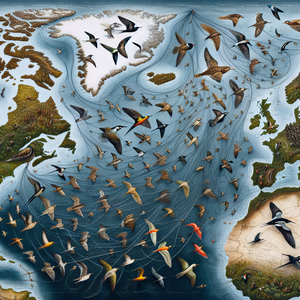Easter Across the Globe: Unique Celebrations You’ve Never Heard Of

In Bermuda, Good Friday is transformed into a kaleidoscope of color as families take to the skies with handmade kites. This tradition, deeply rooted in a blend of British and African heritage, symbolizes the resurrection of Jesus. Families gather to fly kites, often decorated with bright patterns that reflect the vibrant spirit of the island. The day is also marked by communal meals featuring local delicacies like fish cakes and hot cross buns. This unique practice not only emphasizes creativity and community but also serves as a reminder of Easter's deeper meaning—renewal and hope.
Easter in Sweden: Easter Witches
In Sweden, the Easter celebration takes on a whimsical twist as children dress up as "Easter witches." Wearing old clothes, headscarves, and painted cheeks, these young "witches" go door-to-door, exchanging drawings or paintings for candy, much like the Halloween tradition in other parts of the world. This quirky custom is rooted in folklore, where it is believed that witches flew to a mythical land called Blåkulla on Maundy Thursday to meet with the devil. The practice beautifully combines elements of folklore with community interaction, creating a festive atmosphere filled with sweets and joy.
Easter in Greece: The Midnight Resurrection
Easter holds profound religious significance in Greece, culminating in a dramatic midnight service on Holy Saturday. The "Resurrection" ceremony features the priest proclaiming the resurrection of Christ, with congregants lighting candles that symbolize the light of Christ overcoming darkness. Following this emotionally charged service, families gather to share a feast that includes traditional dishes such as lamb and red-dyed eggs, which represent the blood of Christ. This celebration is not merely about religious observance; it is a time for family bonding, breaking the Lenten fast together, and celebrating the triumph of life over death.
Easter in Spain: Semana Santa (Holy Week)
In Spain, Easter is a week-long celebration marked by the elaborate Semana Santa (Holy Week) processions. Cities like Seville and Malaga come alive with grand floats adorned with religious icons, accompanied by participants dressed in traditional robes. These processions are a spectacle of reverence, music, and drama, deeply rooted in cultural identity. The culmination of the week is a vibrant celebration of Christ’s resurrection, intertwining solemnity and festivity, drawing both locals and tourists into the rich cultural experience. This showcases how Easter can serve as a platform for cultural expression while honoring a deeply held faith.
Easter in Australia: The Easter Bilby
In Australia, the Easter Bunny is often replaced by the Easter Bilby, an endangered marsupial native to the continent. This shift not only reflects the country’s unique wildlife but also serves as a platform for raising awareness about conservation. Many Australians participate in initiatives that promote the bilby during the Easter festivities, educating children about wildlife preservation in a fun and engaging manner. This unique association with Easter transforms the holiday into an opportunity for environmental stewardship, making it a celebration that is both joyful and meaningful.
Easter is celebrated in countless ways around the world, each tradition reflecting the unique cultural, historical, and religious contexts of the communities that observe them. From the colorful kites of Bermuda to the environmental advocacy of the Easter Bilby in Australia, these lesser-known customs enrich the global tapestry of Easter celebrations. By embracing and sharing these unique traditions, we can appreciate the diversity of human experiences and the universal themes of renewal, hope, and community that Easter represents. Whether through solemn religious observances or vibrant community festivities, the essence of Easter continues to resonate, inviting us all to celebrate in our own special way. As we look forward to Easter 2025, let us remember the rich variety of celebrations that remind us of the spirit of togetherness and the joy of new beginnings.
Cultural Events Coordinator
Local cultural organizations, non-profit agencies, tourism boards
Responsibilities
Plan and execute cultural events and celebrations, ensuring they reflect the diversity and customs of the community.
Collaborate with local artists, community leaders, and stakeholders to curate authentic experiences.
Manage budgets, logistics, and marketing efforts for events, promoting community engagement.
Required Skills
Strong organizational and project management skills.
Excellent communication and interpersonal abilities to liaise with diverse groups.
Experience in event planning or cultural programming, preferably with a focus on festivals or community celebrations.
Cultural Anthropologist
Universities, research institutions, government agencies, museums
Responsibilities
Conduct field research to study and document cultural practices, traditions, and celebrations across different communities.
Analyze and interpret cultural data to provide insights into social behaviors and community identities.
Present findings through reports, articles, or presentations to academic and public audiences.
Required Skills
Strong analytical and critical thinking skills, with proficiency in qualitative research methods.
Excellent writing and presentation skills to communicate complex ideas effectively.
A master’s degree or Ph.D. in anthropology or a related field is often required.
Community Engagement Specialist
Non-profit organizations, local government, educational institutions
Responsibilities
Develop and implement strategies to engage community members in local events and cultural celebrations.
Facilitate workshops and discussions to foster understanding and appreciation of diverse cultural practices.
Evaluate community feedback and participation to improve future initiatives and programs.
Required Skills
Strong communication and public speaking skills to effectively engage and inspire community members.
Experience in community organizing or outreach, with a focus on inclusivity and diversity.
Familiarity with social media and digital communication tools for promoting community events.
Environmental Education Coordinator
Environmental organizations, zoos, educational institutions
Responsibilities
Design and implement educational programs that promote environmental awareness and conservation through cultural events, like Easter.
Collaborate with schools and community organizations to integrate environmental education into their activities.
Organize workshops and events that align with conservation initiatives, utilizing local wildlife themes.
Required Skills
Background in environmental science, education, or a related field, with a passion for wildlife conservation.
Strong organizational and communication skills to deliver engaging educational content.
Experience in curriculum development and program management is advantageous.
Cultural Heritage Consultant
Heritage organizations, museums, cultural preservation societies
Responsibilities
Advise organizations and communities on preserving and promoting their cultural heritage through events and celebrations.
Conduct assessments of cultural practices to ensure they are accurately represented and respected.
Develop educational materials and resources to raise awareness about specific cultural traditions and their significance.
Required Skills
In-depth knowledge of cultural heritage and preservation practices, often backed by a degree in anthropology, history, or cultural studies.
Strong research and writing skills for creating comprehensive reports and educational materials.
Experience working with diverse communities and understanding their cultural contexts.


